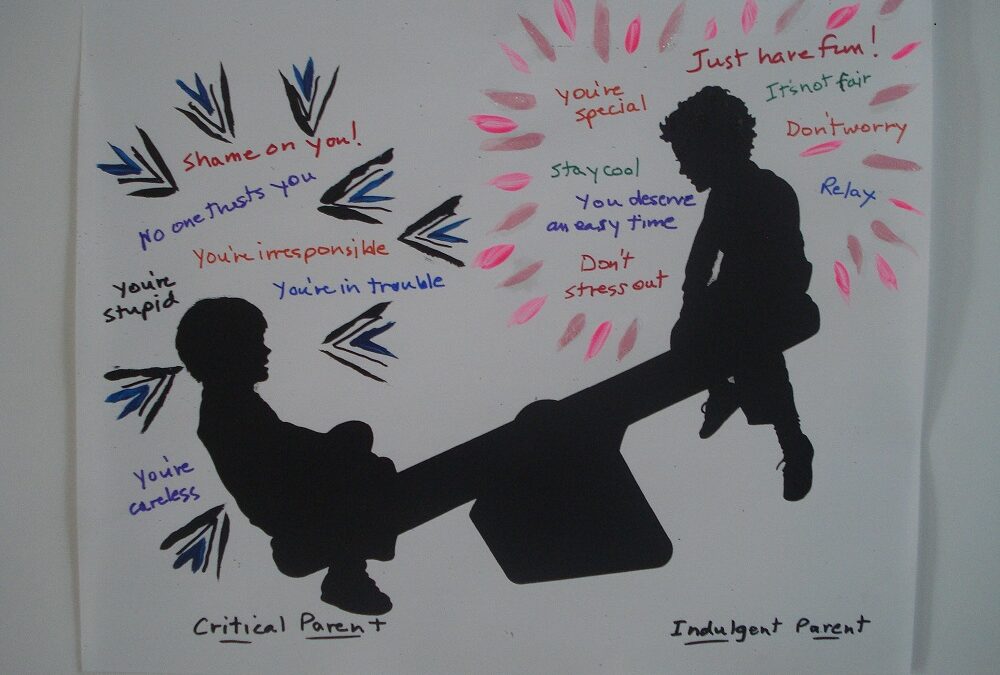A see-saw of self-indulgence and self-punishment happens when you’re set up by your Indulgent Parent (IP). Your Critical Parent (CP) keeps you on a short leash so you can’t get into trouble, scolding your Child each time you fail to measure up to one of the six toxic beliefs your CP holds. Your Indulgent Parent soothes your child into a false sense of security as it supports the next six toxic beliefs.
Let’s take the example procrastination, Toxic Belief # 9, that it’s more comfortable to avoid than to face problems or responsibilities. This belief caters to your Child’s focus on present satisfaction rather than future security. Your Adult may caution, “Do I want the ice cream cone now, or the next-size-smaller pants in a month?” Then your Indulgent Parent whispers, “Oh, it won’t hurt to enjoy just this little treat. You deserve it. Why do today what you can put off until tomorrow?” Or you have a project for school or work that seems so difficult that you can feel your Child’s resistance in your gut. Your IP croons, “You don’t have to start that today; why not wait until you feel more up to it tomorrow?” It might add “It’s just not fair that they expect so much from you,” to encourage Belief # 11, that you’re special so you deserve an easier path.
A month later you’re still in the same size pants, your boss gives you a corrective action and your school project gets a failing grade. Your IP may still tell you it’s not fair or you don’t deserve such treatment, but your Critical Parent torments you for being lazy, irresponsible and lacking in character. Set up by your Indulgent Parent, you’ve traded future well-being for present comfort and your self-esteem has taken a hit. When this see-saw continues, it leads to decreased self-confidence, energy, hope and possible even to depression. Addiction is a frequent companion to this process, where your IP encourages using the drug-of-choice to gain temporary relief from the stress created by your failure to face problems or responsibilities. This process is described in detail in Part II, Chapter 2 of Claim Your Own Mental Fitness.
Your Adult must act with a firm hand to grab the see-saw and tell you to get off. It can identify Belief #9 along with any others involved. For example, your avoidance might have begun after you had a disappointing experience that prompted toxic belief #7, that it’s unbearable to work hard for something and not get it. Your IP may chime in to say, “you tried hard enough to (lose weight, get a promotion, get an A), so why keep trying?” Your Child’s Black and White thinking could prevent you from looking for new ways to cope: it’s fair or unfair, it’s easy or it’s too hard, you’re special or worthless.
Once you’re off the see-saw, and seated with a cool glass of water under a friendly tree, your Wise Parent (WP) could remind you that: 1. Black-and-white thinking traps you into quitting or avoiding, not creative problem solving. It’s better to consider how to cope in a different way. 2. When you put off doing something you have to do, you create low-level anxiety, not peace. You may also end up with additional problems that are even harder to manage. 3 It’s not unbearable if your aren’t rewarded each time you work hard for something; everyone has to learn how to deal with this sometime.
Your Adult can help you break up a task into bite-sized pieces Your Wise Parent can offer encouraging words like, “a journey of a thousand miles begins with a single step” or “remember when you did this well before and how you got there.”

